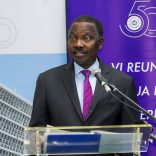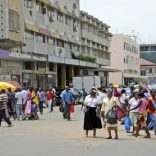Mozambique: Over 18,000 “ghost workers” found in public service
World Bank: Mozambique must restructure its debt as soon as possible to reduce uncertainty

File photo: Folha de Maputo
Shireen Mahdi, the World Bank’s chief economist in Maputo, has advised the Mozambican government to restructure its debt as soon as possible so as to clarify the country’s macroeconomic situation and allow the return of robust growth.
“The Mozambican government has launched a restructuring process with creditors, and this is an important process, which we are following closely,” she told Lusa.
The World Bank hope is to see results, “the sooner the better”.
“Our advice is to reduce uncertainty in the economic landscape, and the longer these discussions take place, the more uncertainty there will be,” Mahdi added. “Clarifying Mozambique’s debt and prospects is critical to restoring [the] macroeconomic stability” that the country needs to grow more robustly.
The institution is also concerned about Mozambique’s dependence on the extractive sector.
At stake is an agreement with the holders of sovereign debt worth US$727.5 million launched in April 2016 on which Mozambique has stopped making repayments, as well as with the creditors of about US$1.4 billion in loans to Proinidicus and Mozambique Asset Management.
The fate of the US$ 2 billion state-guaranteed loans contracted by three state-owned companies in 2013 and 2014 without the knowledge of parliament or international partners is yet to be revealed, the companies claiming state secrecy as a reason not to disclose information, leaving international support to the country blocked.
“Resolving the debt situation would be beneficial to Mozambique,” Mahdi summarised.
The World Bank suspended direct support to the state budget following the financial scandal, “but this is only a part” of total aid to Mozambique. “The bulk of the support has remained” and is targeted at initiatives related to infrastructure, agriculture and other services, she said.
Stabilisation of the macroeconomic situation is important at a time when “interest rates are too high for business”, which means that borrowing from banks is beyond the reach of small and medium-sized enterprises.
“Now that inflation has slowed, it may be time for monetary policy to be relaxed. But for this we need stricter and stronger fiscal policies to control public spending and to improve the efficiency of social spending and investment in infrastructure key for growth,” Mahdi concluded.
Read the full World Bank Mozambique Economic Outlook HERE













Leave a Reply
Be the First to Comment!
You must be logged in to post a comment.
You must be logged in to post a comment.